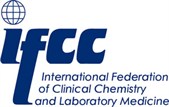IFCC President Message
Published: Thursday, January 25, 2018It is a great pleasure to present my welcoming message to all our national society and corporate member colleagues. It is your expertise and dedication to improve health outcomes for patients and communities that are the greatest strengths of the IFCC. I very much look forward to working closely with you and together facing the opportunities and challenges for laboratory medicine over this next period. It is your expertise which gives me great confidence that we will continue to develop the quality and performance of laboratory medicine to meet the future needs of our patients and the healthcare system.
Laboratory medicine currently faces significant challenges some of which confront all the healthcare disciplines. However we face particular issues arising from the perception of laboratory medicine as merely a service provider rather than a driver for optimal healthcare. Clinical laboratories are being required to assume increased responsibilities for service provision and patient safety with ever decreasing budgets. Financial constraints also impact our corporate members, moderating their ability to collaborate in professional development and, at the same time, the academic basis of laboratory medicine is diminishing.
Professional leadership has never been more vital to provide strategies for improving the crucial role of laboratory medicine in patient care. Such leadership is provided by the IFCC, our regional federations and our national societies. We work in this field together and each of our organizations plays an essential role at the different levels of engagement. Clearly communication is critical and the interactions between the IFCC and the regional federations will now be markedly enhanced with the inclusion of representatives of each of the regional federations on the IFCC Executive Board. The IFCC General Conference, this year being held in November, provides further opportunity between the national society representatives, regional federations and IFCC Officers to engage in discussions and debate on the key issues currently facing laboratory medicine.
As President I look forward to extending the work of the IFCC in a range of important areas.
Technologies relevant to clinical laboratory practice are rapidly emerging from academic and industry research laboratories and being adopted by highly specialized scientists within clinical laboratories. But their full benefits for patient care cannot be realized until they are translated to areas capable of high-throughput processing for medical tests and meeting performance criteria for accreditation purposes. The Emerging Technologies Division (ETD) is a new addition to the IFCC functional units and is responsible for identifying and assessing emerging technologies and translating the emerging and disruptive diagnostic and data analysis procedures from academic laboratories to clinical laboratories and from clinical laboratories to routine practice.
Improving clinical laboratory performance through standardization and traceability as it impacts on the rational use of clinical laboratory resources continues to be a major focus of the Scientific Division. This work will be enhanced by the IFCC hosting the International Consortium for Harmonization of Clinical Laboratory Results (ICHCLR) which will improving the close working relationships between IFCC, ICHCLR and the Joint Committee for Traceability in Laboratory medicine (JCTLM) during the next triennium. A major challenge is to extend these activities to regions in which the current multi-national In-Vitro Diagnostic industry members are not necessarily the major providers of clinical laboratory instruments and reagents, such as in the Asia Pacific and Central and South American regions. Major achievements have been made in this field only with the close collaboration of the IFCC with relevant institutions in Europe (European Commission - Joint Research Centre) and the USA (National Institute of Science and Technology). During 2018 these collaborations will extend to China (National Institute for Food and Drug Control). We look forward to continuing this important work in collaboration with these important institutions.
IFCC educational and training activities capable of meeting the needs of both developing and developed communities across general laboratory medicine subjects, specialised services and clinical laboratory management have long been a high priority for IFCC. It is most gratifying that this work will be enhanced through the joint efforts of the Education and Management Division and Communications and Publications Division with the promotion of eLearning facilities and opportunities. These electronic resources will be available to clinical laboratory practitioners around the world with internet access.
As discussed above laboratory medicine faces particular challenges and it is important that as a profession we improve our ability to present a coherent strategy to our clinical colleagues, to healthcare managers and those paying for medical tests such as insurers and governments. Closer interactions between international organisations representing the various disciplines of laboratory medicine will greatly assist common engagement by our profession with these stakeholders. Of particular interest in these collaborations will be value of medical tests in order to demonstrate to all stakeholders in healthcare that laboratory medicine can be a a driver of optimal and financially sustainable healthcare delivery.
I look forward to working directly with many of you over the next triennium and particularly hope we can meet at the IFCC General Conference being held in Budapest in November. I welcome any suggestions to improve our organization and activities.
Best wishes,
Prof. Howard Morris
IFCC President
